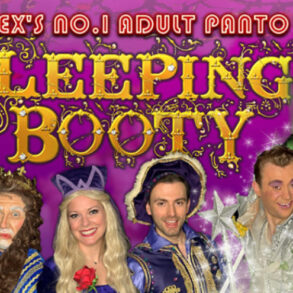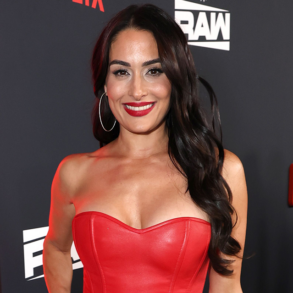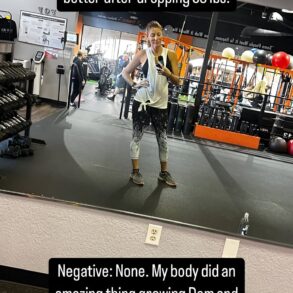It was just before Christmas, and eight-year-old Gloria Moraa sat holding a mirror as her aunt painted her curls with chemicals that would straighten every strand. “All the young girls would get matching hairstyles for the holidays, and relaxers were fashionable back then,’’ says Moraa, now 28, who lives in Nairobi, Kenya.
She no longer straightens her hair because she thought it was starting to thin. But over the years, Moraa used almost every relaxer on the market, with one goal: making her coily hair silky. The ingredients didn’t matter.
“I did not have the time or the expertise to discern the effects of listed ingredients,” Moraa says. “I’m a consumer, not a chemist.”
But questions are being raised about the safety of the ingredients in these products.
In October 2022, the US National Institutes of Health (NIH) published a study that found women who used hair relaxers more than four times a year were at a higher risk of uterine cancer. The study marked a tipping point in the US, building on more than a decade of scientific research in which women’s exposure to chemicals known as endocrine disruptors appeared to correlate with the development of uterine and breast tumours.
Endocrine disruptors interfere with hormones that regulate functions such as mood, appetite, cognitive development and reproductive health.
While many black women in the US are now rejecting chemical straighteners – filing thousands of lawsuits against manufacturers in the wake of the study – sales of the products in some African countries continue to climb.
Tunisia, Kenya and Cameroon were among the countries worldwide leading sales growth for perms and relaxers from 2017 to 2022, according to Euromonitor, a market research firm. Sales in Tunisia and Kenya jumped 10% over the five-year span. South Africa and Nigeria also saw growth.

“People still use hair relaxers as much as they did in the past,” says Joseph Kiemo, who runs Kiemo Hair and Beauty Studio in Nairobi.
Africa is a lucrative market for the cosmetics industry. It has the youngest and fastest-growing population of any continent, an expanding middle class and a flourishing community of millionaires. Hair and skin products are being developed to meet consumer needs.
The global hair relaxer market is expected to grow from $718m (£570m) in 2021 to $854m annually by 2028.
The companies at the centre of the US lawsuits produce some of Africa’s most popular brands. Dark & Lovely, owned by L’Oréal, is the best-selling relaxer in Nigeria. Ors Olive Oil No-Lye Relaxer, produced by Namaste Laboratories, is in second place. In Kenya, TCB Naturals is owned by Godrej Consumer Products, which describes itself as the “largest player globally in hair care for women of African descent”. All the listed brands are named in the lawsuit.
For many black women, chemically straightening their hair is a rite of passage informed by Eurocentric definitions of beauty that favour long, straight hair and are rooted in colonialism and racism. But women also say manageability and social acceptance drive the decision.
“We understand that black women use hair relaxers for a range of reasons, some within their control, some not,” says Seyi Falodun-Liburd, a strategist at Level Up, a UK gender justice organisation. “So, for us, it’s not about shaming any black woman about making whatever choices she makes.”
It’s about government and corporate accountability, says Falodun-Liburd, who led a campaign to get L’Oréal, the world’s largest beauty company, to end sales of its hair-straightening products.
Governments should require the disclosure of potential health effects and ban dangerous ingredients, she says.
In May 2022, Level Up released the findings of what it says is the first research about black women’s experiences with relaxers in the UK, surveying more than 1,000 women. Falodun-Liburd was not surprised by the results: 77% of the women were not aware of an increased risk of cancer from long-term use of relaxers.
“I think most black women would not consciously decide to put something on their head that would harm them, and the issue is that most don’t know,” she says.
Ikamara Larasi, a Level Up campaigner, says the study shows why producers of hair products should be more transparent about their ingredients. “The price of black women’s beauty should never be black women’s health.”




Mary Cunningham, from New York City, is among thousands of people suing haircare companies. Her daughter, Telichia Cunningham-Morris, died of uterine cancer at the age of 50 in June 2021. When Cunningham-Morris was little she wore her relaxed hair in three pigtails that skipped past her shoulders. Her mother started chemically straightening her and her sister’s hair every six to eight weeks from when they were about six years old. It made managing their hair and a busy family life easier.
Kiddie Kit was their first relaxer, a brand long gone. But in the 1980s, the box was decorated with drawings of an adolescent black girl, straight tresses sweeping her shoulders as she swims and cartwheels with a young male admirer.
Cunningham-Morris used relaxers for decades, until about six years ago, when she and her sister made a pact to go natural.
Cunningham, 75, and her younger daughter, Travias Cunningham-Case, 51, believe endocrine disrupters in the relaxers caused Cunningham-Morris’s death. Both women blame the chemicals for their own hysterectomies: Cunningham’s because of fibroids, and Cunningham-Case’s for endometriosis.
“It seemed like all three of us had some kind of female problems all the time. Now, it makes sense to me that’s where it came from,” says Cunningham, reflecting on the price she believes her family paid for straight hair.




Some of the most concerning ingredients in relaxers, scientists say, are formaldehyde, a carcinogen, and phthalates, parabens and Bisphenol A – chemicals known or suspected to be endocrine disruptors.
Bisphenol A, which appears under various names, is used to produce plastics. Phthalates make plastics more durable and parabens are preservatives.
A sample of products sold in Africa reviewed for this report were found to have parabens. Phthalates are often found in fragrances and are not included in the list as separate ingredients.
Regulations on such chemicals vary. The EU bans some endocrine disruptors used in cosmetics and has proposed prohibition in other products, including toys. The EU says it hopes to “phase out” some chemicals in consumer products by 2030.
Some countries, including Brazil and Canada, have banned or restricted the use of formaldehyde in relaxers. The US Food and Drug Administration is due to make a decision on a ban this month.
Nigeria has warned consumers to avoid using hair products containing formaldehyde.
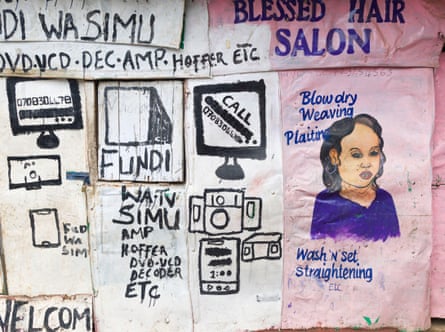



Most governments require companies to list ingredients on product boxes. Health experts, however, say that does not ensure consumers understand the potential harm of relaxers.
“The more we educate [people] about what these chemicals are and the potential adverse health effects that may be associated with them, perhaps people could make more informed decisions about whether to use these products,” says Prof Adana Llanos, an epidemiologist at Columbia University’s Mailman School of Public Health, co-author of a 2022 article suggesting policy changes to reduce exposure to potentially harmful hair products.
Llanos is working with the Kenya Medical Research Institute to study hair and personal care products in Kenya.
American women began to sue relaxer manufacturers shortly after the publication of the 2022 NIH study, in US lawsuits that claim there has been a failure to warn consumers of possible health risks. In November, a federal judge in Chicago ruled that a multi-jurisdictional litigation against a number of companies, including L’Oréal, Revlon, Namaste and Godrej, could proceed, opening the door to a massive court battle.
The companies deny wrongdoing and claimplaintiffs’ injuries were not caused by their products.
A L’Oréal spokesperson says the NIH study was based on “a small number of uterine cancer cases” and “does not conclude that using these products causes certain health outcomes, such as uterine cancer. Tellingly, the study states that ‘more research is warranted’.”
They add: “Our hair relaxer products do not contain any ingredient defined as an ‘endocrine disruptor’ by the World Health Organization.
“While we understand the desire of each plaintiff to find answers and relief to their personal health concerns, we are confident in the safety of our products and believe the allegations made in these lawsuits have neither legal nor scientific merit.”
Namaste Laboratories, Godrej and Revlon did not respond to requests for comment.
Previously, Revlon told Reuters the company did not “believe the science supports a link between chemical hair straighteners or relaxers and cancer”.
The WHO is expected to update its definitions of endocrine disruptors next year based on recent research, but it is not known what will be included.
In Lagos, Nigeria, hair relaxers continue to be popular. Kate Akpabio, a seamstress, is washing her braided hair in a salon on a hot Saturday afternoon. Akpabio has been straightening her hair for seven years but read on Facebook about the study linking frequent use with cancer.
“It doesn’t change my attitude towards relaxing my hair,” she says.
Favour Godwin didn’t know about the NIH study. A trader at an electronics market in Lagos, she has experienced a burning scalp from some relaxers but does not plan to stop using products.
“I can’t even cope without relaxing my hair every two months,” she says.
In the US, before the lawsuits sales were declining as a natural hair movement began to flourish. Relaxer and perm sales declined by about 9% between 2017 and 2022. Sales will probably continue to dip, says Caro Bush, a research associate at the market research firm Euromonitor. “Consumers are apprehensive of the chemical composition of these products and their impact on health.”
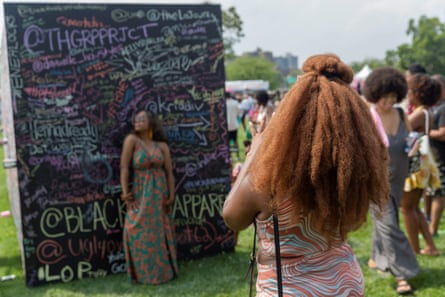



Demand for natural haircare products is a market opportunity she says.
Bigger companies have acquired some of the small brands in recent years. Last year, Procter and Gamble bought Mielle Organics, a black-owned natural haircare company. And more than two years ago, L’Oréal created Dark & Lovely Blowout, a hair cream that protects natural hair.
In Africa, interest in natural hair products is growing. In South Africa, Leshme de Bruyn sells a line products called Miss L – Embrace My Roots. A bad experience with hair dyes and relaxers inspired her company motto: “My products will bring you back to the natural hair you had before it started to get chemically damaged.”
De Bruyn says: “Nowadays, they don’t do the blow dry and curls and flat irons. Younger people are saying, ‘This is the hair I’ve been born with, and I’m going to embrace it.’”
Julie Ouandji, 38, who was raised in Cameroon and France, runs Nappy Francophones, giving hair tips and inspiring black women from Francophone countries to go natural. She stopped using chemicals on her hair after reading early studies questioning the health effects.




“I want to encourage black women to love their hair and be happy about their hair,” she says.
Ouandji, now living in Canada, first relaxed her hair when she was 13. Fifteen years later, she did “the big chop”, cutting her hair, and recalls being afraid of how she would look.
“I was like, ‘I’m not sure it’s going to suit me,’” she says. “It’s really interesting to feel that way when I think about it. It’s your natural hair. Obviously, it’s going to suit you.”
As a girl, Ouandji was influenced by the women on TV, none of whom had natural hair.
“It’s really important for our generation to have more Afros in the media so our daughters and granddaughters will want to keep their natural hair,” says Ouandji.
“I would like all women to stop relaxing their hair,” she says. “But that’s utopia.”
Additional reporting by Blessing Oladunjoye from Nigeria’s BONews
This article is a co-publication with The Examination, a nonprofit newsroom reporting on global health.
This post was originally published on this site be sure to check out more of their content.




